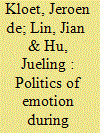| Srl | Item |
| 1 |
ID:
189977


|
|
|
|
|
| Summary/Abstract |
Although there may be disagreement about the consequences of technology, such as the Internet, on Chinese philanthropy, there is consensus that giant tech companies have profoundly reshaped the field. One outcome is that this has led to the rise of digital philanthropy. The extant studies on the impact of the Internet on philanthropic practices tend to be limited to investigations of a specific platform (e.g. Weibo), while overlooking the heterogeneity of tech-empowered digital philanthropy in China. This study is an introduction to the diversity and the platformization of digital philanthropy. We use a snowball sampling online survey (n = 2132) to examine people’s attitudes towards digital philanthropy to understand user perceptions of some of the most common digital philanthropy platforms and products. The sample captures more educated mobile phone users already active on digital platforms. Based on the results, we categorize and discuss the three most mentioned types of digital philanthropy products: event-based products, issue-based products, and gamified mini-programs. We provide some insight on how these philanthropic products are engineered to blur the boundaries between online and offline activities to leverage tech companies’ mega platforms. The platformization of digital philanthropy has potential consequences for the evolving state–business–society relationship.
|
|
|
|
|
|
|
|
|
|
|
|
|
|
|
|
| 2 |
ID:
182979


|
|
|
|
|
| Summary/Abstract |
In this article, we analyse the most popular stories that circulated on WeChat public accounts concerning personalized experiences of COVID-19 in China during the first three months of 2020. Among these non-fictional online writings, we probe into ‘individual’ and mediated experiences with the coronavirus in China by questioning the visualizations and discourses of these stories and their producers, as well as the concomitant emotions they invoked. Parallel to the changing situation of the pandemic, we observe a diachronic evolution of emotions, from fear and doubt to (nationalist) pride. While articulating personalized experiences of the pandemic from disparate perspectives, the stories invariably built on, and were shaped by, the workings of the WeChat public account platform (公众平台) as evidenced by its content moderation logic and political economy. The analysis shows that emotions, rather than facts, propel the popularity of these stories. The measures taken by the state are mostly applauded, and only sometimes questioned; tragic memories are rewritten, and a political and economic order is consolidated.
|
|
|
|
|
|
|
|
|
|
|
|
|
|
|
|